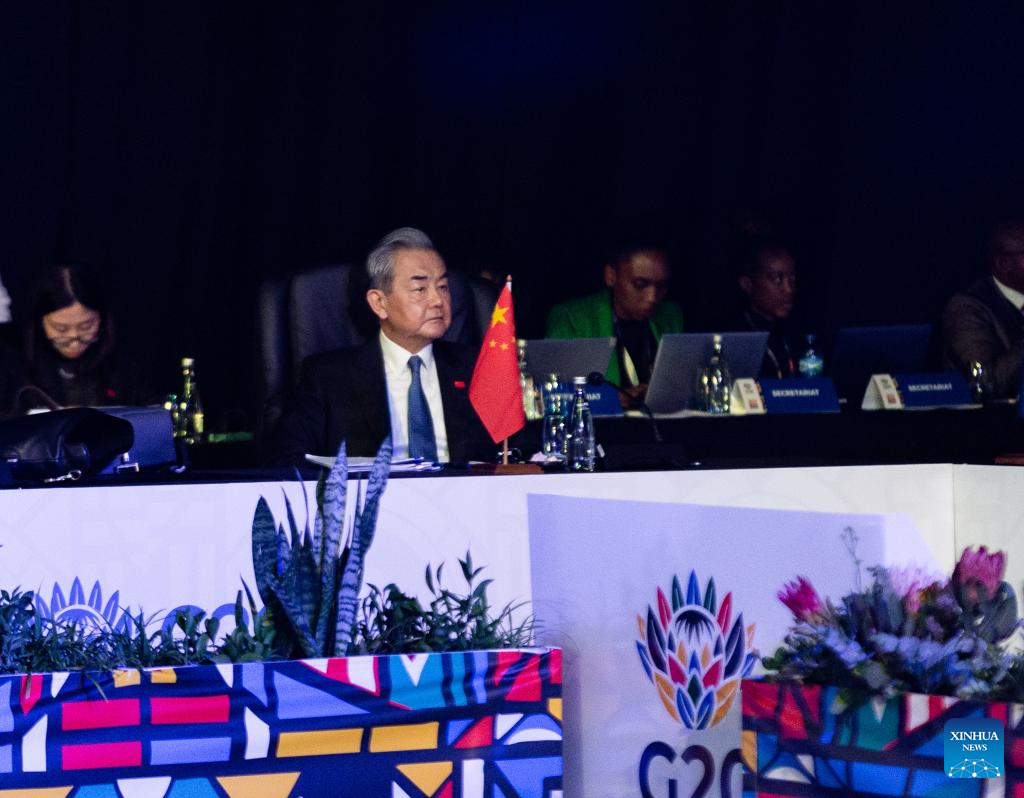
Chinese Foreign Minister Wang Yi, also a member of the Political Bureau of the Communist Party of China Central Committee, attends the Group of 20 (G20) Foreign Ministers' Meeting in Johannesburg, South Africa, Feb 20, 2025. [Photo/Xinhua]
China has long upheld the Five Principles of Peaceful Coexistence. It believes that the Five Principles of mutual respect for sovereignty and territorial integrity, mutual nonaggression, mutual noninterference in each other's internal affairs, equality and mutual benefit, and peaceful coexistence, are a common asset of the international community, and should be valued, inherited and further promoted.
China's guiding thought on diplomacy provides strategic guidance for the country to draw wisdom from the Five Principles in its efforts to build consensus on tackling the problems and challenges facing the world today. It underscores that rather than being obsolete, they have only become more appealing and should be valued, inherited and further promoted.
As Foreign Minister Wang Yi stressed on Thursday, they "remain as relevant as ever under current circumstances". Speaking at the G20 Foreign Ministers' Meeting in Johannesburg, South Africa, Wang called for G20 members to act as the guardians of world peace by putting these principles into practice.
In the proposals he put forward at the meeting, Wang emphasized the importance of firmly safeguarding the international system with the United Nations at its core, the international order underpinned by international law, and the basic norms governing international relations based on the purposes and principles of the UN Charter. On the sidelines of the conference, Wang met with foreign ministers of different countries, including South Africa, Russia, India and Australia, and the Chinese foreign minister expressed similar messages in these meetings that were actively echoed by his counterparts.
Chinese President Xi Jinping has proposed the Global Security Initiative, which advocates the vision of common, comprehensive, cooperative and sustainable security, a new path to security featuring dialogue rather than confrontation, partnership rather than alliance, win-win rather than zero-sum relations, and a joint response to traditional and nontraditional security risks and challenges. This provides the blueprint for countries to act as the builders of universal security. And as Wang stressed in his sideline meetings, China is ready for closer exchanges and cooperation with all countries in this regard. Wang also emphasized the importance of defending multilateralism.
Unilateralism and trade protectionism have resurged in recent years, which have greatly disrupted global industry and supply chains. As a result, global economic development has encountered strong headwinds, and many countries, especially developing countries, are experiencing difficulties.
As the international situation becomes more complex and global challenges more acute, it is all the more important for countries not to resort to the law of the jungle.
Following the guidance of Xi's thought on diplomacy, China promotes a world of balanced development, peaceful coexistence and overall stability. It calls for countries to persevere with dialogue and negotiation, and seek the peaceful settlement of differences and political solutions to international and regional burning issues.
Regarding the Ukraine crisis, China has been actively promoting peace talks in line with President Xi's four-point observations about what must be done. It supports all efforts dedicated to peace, including the recent engagement between the United States and Russia. China hopes that the relevant parties can find a sustainable and lasting solution that takes into account each other's concerns.
On the situation in the Middle East, China maintains that the Gaza ceasefire agreement must be implemented in a continuous and effective manner. "Palestinians governing Palestine" is an important principle that must be upheld in the post-conflict governance of the Gaza Strip, and the two-state solution is the only viable way to secure lasting peace between Israel and Palestine and peace in the Middle East at large.
China has territorial disputes with some of its neighbors, and it has long maintained that such disputes should be settled through talks and negotiations. The country always believes that disputes and differences, if not resolved, can be shelved, and cooperation can be developed by seeking common ground. China will always do whatever it can for the safeguarding of world peace and for the promotion of multilateralism.
China always endeavors to match its words with deeds. It was a driver for the realization of the Regional Comprehensive Economic Partnership, and a leading promoter of the Belt and Road Initiative, a global public good and platform for common development that it initiated. It has thus been the catalyst for the development of the regional and global economy.
China will continue to act in pursuit of its vision of a world with a shared future of peace and stability.